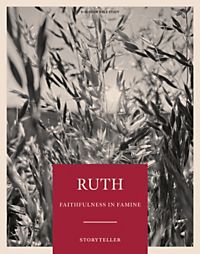This is an excerpt from the Ruth - Storyteller Bible Study.
The beginning of Ruth makes us think the book is a horrible tragedy. The middle makes us think it is a beautiful love story. In the end, we discover it is both. In fact, Ruth’s story is a gospel story.
Ruth lived during the time of the judges, when God’s people weren’t acting at all like God’s people. Their motto wasn’t all that different from one we hear today. People in Israel were “living their truth,” believing that whatever seemed right to a person was, in fact, right for that person. And there were consequences.
As Ruth’s story unfolds, we will see that the tragedy of sin and its consequences are met with grace and provision from God. Ruth’s story will reveal to us the extent of God’s grace.
The tragedy that unfolds in the first verses of Ruth illuminates the brokenness of humanity—through the perspective of a single family. Sin’s effects are ever-present in the world, not just in a global sense, but in every single, solitary life. Yet, at the very same time, God is at work. As Ruth’s story unfolds, we will see that the tragedy of sin and its consequences are met with grace and provision from God. Ruth’s story will reveal to us the extent of God’s grace. This is good news, because the God we meet in the book of Ruth is exactly who God is throughout time and circumstance. No matter what’s happening in our lives, God meets us there and draws us to Himself. But to participate with Him in that story, we must first recognize our brokenness.
Faithfulness is a personal choice we each must make. Joshua knew it, and at the end of his earthly life, he said it out loud. The Israelites needed to make a choice: who they would serve—the One true God who keeps every promise or the pagan gods of the world whose promises are only shadows (see Joshua 24:15).
At Joshua’s call, the people agreed to serve the Lord, but that choice didn’t last. Within a generation, they had once again lost their way.
This is the spiritual context in which Ruth takes place. This famine didn’t occur in a time when God’s people were faithfully following Him. This wasn’t a “Why do bad things happen to good people?” type of situation. The book’s opening phrase, “During the time of the judges,” informs us that the events in Ruth took place during one of the darkest times in Israel’s history, when “Everyone did what seemed right to him.” In other words, all people had chosen their own way instead of God’s way. They were sinning and unrepentant—and they were facing the consequences of those choices. It is likely that the famine was part of God’s judgment on His people for abandoning Him to worship other gods (see Judges 2:11-15). The situation in Ruth informs us about our own: what seems right to us is wrong. We all have sin in our lives that carries unavoidable and devastating consequences—a famine of the soul that ends in certain death. We are broken in a way that no improvement of circumstance can fix. Yet, as we will see across the pages of Ruth’s story, God faithfully provides the way. And the call to turn to Him in faith remains, even the darkest, most difficult days.
We are broken in a way that no improvement of circumstance can fix. Yet, as we will see across the pages of Ruth’s story, God faithfully provides the way.
“It seemed like a good idea at the time.” You’ve probably heard someone say those words, or you may have even said them yourself. It’s a popular expression used to voice regret over a decision made with good intentions that ended up having bad results.
And if Elimelech had the opportunity to speak on his own behalf in Ruth, he might choose those same words. That’s the thing about sin—it very often seems right. In Elimelech’s case, it may have even seemed necessary. We don’t know much about his family’s exact situation, but there was famine in Bethlehem. Famine in any context causes apprehension. Even the remote possibility of scarcity causes us to race to the grocery store to hoard our favorite snacks. This was worse. Bethlehem (literally “House of Bread” in Hebrew) was named after bread, but there was no bread to be found.
It is likely that Elimelech exhausted numerous potential solutions before packing up and moving to Moab. In taking this view, we can assume the best that Ruth allows. But we should not confuse Elimelech for Abraham. The latter was willing to faithfully follow God into uncertain territory. The former was unwilling to faithfully remain in the very land Abraham sacrificed everything for God’s people to receive. Elimelech turned his back on God’s promises and took his family to live among God’s enemies.
The hard truth we must consider is that we are more often like Elimelech than we are like Abraham. Instead of faithfully going or staying wherever the Lord leads us, we are prone to go to those places that seem right in our circumstances—and settle there.
Brokenness, then, is a byproduct of our sin. Void of prayerful consideration and obedience to God’s commands, acting on what seems like a good idea distances us from God and displaces us from our purpose among His people.
Ruth - Storyteller Bible Study Book
The book of Ruth invites us to wait and hope along with the characters as we wait and hope for our redemption. Through Ruth we find a God who is always at work behind the scenes ready to show his faithfulness.

